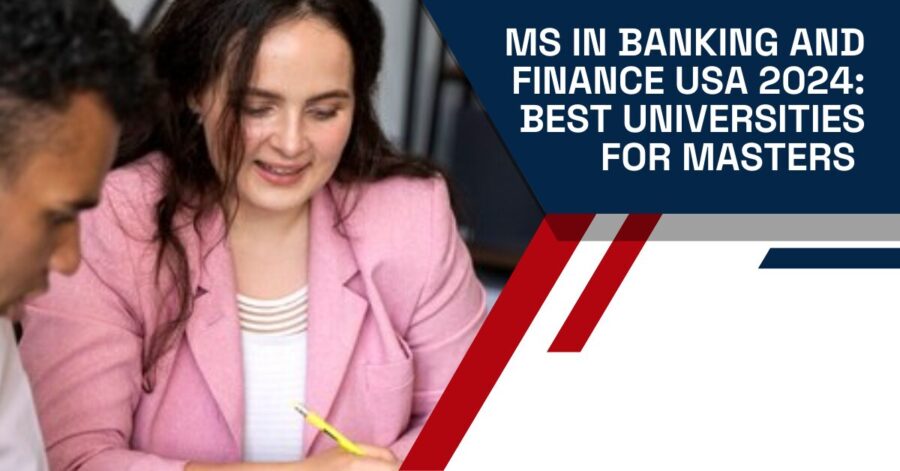17 December 2024
5 minutes read
MS In Banking And Finance USA 2024: Best Universities For Masters

Key Takeaways
- An MS in Banking and FinanceUSA universities equips you with essential skills for high-demand roles in the financial industry.
- The curriculum is designed to blend theoretical knowledge with practical application, preparing you for real-world financial challenges.
- Graduates can expect diverse career opportunities with strong salary prospects, especially in areas like investment banking, corporate finance, and financial consulting.
The landscape of banking and finance is ever-evolving, with the demand for skilled professionals continuing to rise. In the heart of this dynamic environment, the USA emerges as a premier destination for pursuing a Master’s in Finance, offering a blend of rigorous excellent academic curriculum, cutting-edge financial research, and unparalleled career opportunities. This is especially true for international students. As 2024 approaches, the quest for knowledge, expertise, and innovation in banking and finance beckons scholars and professionals alike to explore the wealth of MS in banking and finance USA 2024.
Why Pursue a Master in Finance in the USA?
Embarking on a Master’s journey in finance and banking in the USA not only opens doors to the global financial markets but also prepares you for a thriving career in various sectors including investment banking, financial planning, risk management, and corporate finance.

- Global Recognition: Degrees from US institutions are renowned worldwide for their excellence and rigor.
- Diverse Specializations: From corporate finance to investment banking, the programs offer a plethora of specializations catering to your career aspirations.
- Networking Opportunities: Studying in the US provides unparalleled access to industry leaders, internships, and employment opportunities in the finance sector.
Top Universities and Programs for MS In Banking And Finance USA
Pursuing an MS in Banking and Finance in the USA opens doors to some of the world’s most prestigious universities and programs. Known for their rigorous curriculum and strong industry connections, these institutions provide students with the skills and knowledge needed to thrive in the financial sector. Whether you’re aiming for a career in investment banking, financial analysis, or corporate finance, choosing the right program is key to shaping your future success. Let’s explore the top universities and programs for MS in Banking and Finance in the USA.
| University | Program | Specializations | Duration | Estimated Fee | Key Features |
|---|---|---|---|---|---|
| University of Boston | Master of Science in Finance (MSF) | Investment Banking, Risk Management, Financial Analysis | 1-2 years | $50,000 – $70,000 | Offers both part-time and full-time options; strong focus on quantitative analysis and real-world application. |
| University of Chicago | Master of Science in Financial Management | Corporate Finance, Portfolio Management, Financial Analytics | 1-2 years | $60,000 – $80,000 | Renowned faculty; integrates theory with practice through case studies and projects. |
| New York University | Master of Science in Financial Engineering | Quantitative Finance, Financial Technology, Risk Management | 1.5 years | $70,000 – $90,000 | Interdisciplinary program combining finance, mathematics, and computer science; strong industry connections. |
| Stanford University | Master of Science in Finance | Behavioral Finance, Experimental Finance, Corporate Investment | 1 year | $68,000 – $90,000 | Intensive one-year program; focuses on advanced finance topics and research methodologies. |
| Columbia University | Master of Professional Accountancy | Accounting, Financial Regulation, Auditing | 1-1.5 years | $65,000 – $85,000 | Emphasis on professional ethics, regulatory environments, and global accounting practices. |
What Are The Curriculum and Learning Outcomes for MS In Banking And Finance USA?
The curriculum and learning outcomes of an MS in Banking and Finance in the USA are designed to equip students with advanced financial expertise, practical skills, and a global perspective essential for navigating the dynamic world of finance.
| Core Course | Description | Learning Outcomes |
|---|---|---|
| Financial Theory | Explores the principles underlying financial decision-making. | Understand the framework for evaluating financial assets and making investment decisions. |
| Corporate Finance | Examination of corporate financing and investment decisions. | Ability to analyze corporate financial strategies and manage corporate capital. |
| Econometrics | Application of statistical methods to the study of economic and financial data. | Develop skills in quantitative analysis and predictive modeling. |
| Financial Markets and Instruments | Overview of various financial markets and instruments. | Knowledge of how financial markets operate and the role of different financial instruments. |
Admission Requirements and Process
To secure admission to a Master’s in Banking and Finance program in the USA, prospective students must meticulously prepare and submit their applications. Here are the detailed requirements and steps involved in the process:
- Bachelor’s Degree: Hold a bachelor’s degree from an accredited institution, preferably in finance, economics, business, or a related field.
- Standardized Tests: Submit scores from standardized tests such as the GMAT or GRE. High scores in these tests demonstrate analytical and quantitative competencies.
- English Language Proficiency: Non-native English speakers must provide TOEFL or IELTS scores to prove their proficiency in English.
- Work Experience: While not always mandatory, relevant work experience in banking, finance, or related sectors can significantly strengthen an application.
- Letters of Recommendation: Submit two to three letters of recommendation from academicians or professionals who can vouch for the applicant’s abilities and potential.
- Statement of Purpose: A well-crafted statement of purpose that outlines the applicant’s academic interests, professional goals, and reasons for choosing the specific program.
- Resume/CV: Provide a detailed resume or CV highlighting educational qualifications, work experience, achievements, and skills.
- Application Form and Fee: Complete the application form for the desired university and program, accompanied by the required application fee.
Career Prospects and Salary Outlook
The career prospects and salary outlook for graduates with an MS in Banking and Finance in the USA are promising, offering diverse opportunities in sectors like investment banking, corporate finance, and financial consulting, with competitive salaries reflecting the high demand for financial experts.
| Job Role | Description | Average Starting Salary | Growth Outlook |
|---|---|---|---|
| Financial Analyst | Analyze financial data to assist business decisions. | $70,000 – $85,000 | Steady growth; driven by the need for in-depth market and financial analysis. |
| Investment Banker | Advise on and facilitate large financial transactions. | $100,000 – $150,000 (with bonuses) | High demand in corporate finance and capital markets. |
| Risk Manager | Identify and mitigate financial risks within organizations. | $90,000 – $120,000 | Increasing importance due to evolving market dynamics and regulations. |
| Financial Planner | Provide advice on financial management and planning. | $65,000 – $90,000 | Growing as individuals seek help with personal finances, investments, and retirement planning. |
Tips and Strategies For Admission
Securing admission to a prestigious Master’s program requires careful planning and strategic execution. Here are some tips to navigate the admission process effectively:

- Start Early: Begin your research and preparation well in advance to meet application deadlines and have ample time for test preparation.
- Research Thoroughly: Investigate various programs and universities to find those that best match your career goals and academic interests.
- Engage with Alumni and Current Students: Connecting with alumni and current students can provide invaluable insights into the program and help strengthen your application.
- Tailor Your Application: Customize your application, especially the statement of purpose, to reflect how you align with the program’s objectives and values.
- Prepare for Interviews: Some programs may require interviews. Practice and prepare to articulate your motivations, experiences, and how the program fits into your career plan.
- Seek Feedback on Your Application: Before submitting, get feedback on your application materials from mentors, peers, or professionals in the field.
- Apply to Multiple Programs: To increase your chances of acceptance, apply to multiple programs that align with your goals and qualifications.
Seizing Opportunities in Finance
The pursuit of a Master’s in Banking and Finance in the USA offers not just an advanced education but a gateway to a world of opportunities in the global financial landscape. As 2024 approaches, the time is ripe for aspiring finance professionals to embark on this transformative journey, armed with ambition and the promise of innovation, growth, and success in the ever-evolving realm of banking and finance.
Conquer the GRE with Ambitio’s customized preparation program. Our approach is tailored to your unique learning style and preparation needs, offering a suite of resources that includes in-depth lessons, practice questions, and personalized feedback to help you achieve exceptional results.
FAQs
What are the admission requirements for an MS in Banking and Finance in the USA?
Most programs require a bachelor’s degree, GRE/GMAT scores, TOEFL/IELTS for international students, letters of recommendation, and a statement of purpose.
Do I need work experience to apply for an MS in Banking and Finance?
While not always mandatory, some universities prefer applicants with prior work experience in finance or related fields.
What skills will I gain from an MS in Banking and Finance?
You’ll develop expertise in financial analysis, risk management, investment strategies, and global banking regulations.
How long does it take to complete the program?
Typically, the MS in Banking and Finance takes 1 to 2 years to complete, depending on the university and program structure.
What are the career prospects after completing an MS in Banking and Finance?
Graduates can pursue roles such as financial analyst, investment banker, risk manager, corporate finance manager, and consultant.
What is the average salary for MS in Banking and Finance graduates in the USA?
Salaries vary by role and location, but graduates typically earn between $80,000 to $120,000 annually in entry- to mid-level positions.
Can I pursue an MS in Banking and Finance without a background in finance?
Yes, many programs accept students from diverse academic backgrounds, though you may need to take foundational finance courses before starting the core curriculum.

You can study at top universities worldwide!
Get expert tips and tricks to get into top universities with a free expert session.
Book Your Free 30-Minute Session Now! Book a call now




























